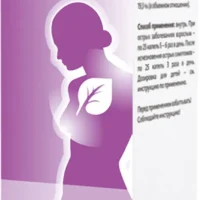Description
Esmia (Ulipristal Acetate) Tablets 5 mg. №28
Ingredients
Each tablet contains 5 mg of ulipristal acetate as the active ingredient.
Mechanism of Action
The pharmacological action of ulipristal acetate involves delaying or inhibiting ovulation, thereby preventing fertilization. It may also alter the endometrium, reducing the likelihood of implantation.
Pharmacological Properties
Ulipristal acetate acts by delaying or inhibiting ovulation and altering the endometrium, thus preventing pregnancy.
Indications for Use
Esmia tablets are indicated for emergency contraception to prevent pregnancy after unprotected intercourse or contraceptive failure.
Contraindications
Do not use Esmia if you are already pregnant, have severe asthma, or are allergic to ulipristal acetate or any other ingredients in the tablets.
Side Effects
Common side effects may include nausea, abdominal pain, headache, and menstrual changes. Consult a healthcare provider if any adverse reactions occur.
Usage Instructions
The recommended dosage is one tablet orally, with or without food, as soon as possible within 120 hours (5 days) after unprotected intercourse or contraceptive failure. Take one tablet orally with water as soon as possible after unprotected intercourse. Consult a healthcare provider for further guidance.
Benefits Compared to Analogues
Compared to other emergency contraceptive options, ulipristal acetate has been shown to be more effective, especially when taken closer to the time of unprotected intercourse. It is well-tolerated with a favorable safety profile.
Suitable Patient Groups
Esmia tablets are suitable for use in adult women of reproductive age. Consult a healthcare provider for guidance on use in specific patient populations such as adolescents, elderly individuals, or those with underlying medical conditions.
Storage and Shelf Life
Store Esmia tablets in a cool, dry place away from direct sunlight. Check the expiration date on the packaging and do not use the tablets if expired.
Packaging Description
Esmia tablets are supplied in a pack containing 28 tablets. The packaging is designed to protect the tablets from moisture and ensure product integrity.
Clinical Evidence and Proven Effectiveness
Esmia (Ulipristal Acetate) tablets have been extensively studied for their efficacy and safety in preventing pregnancy after unprotected intercourse. Clinical trials have shown that ulipristal acetate is highly effective in reducing the risk of pregnancy when taken within the recommended time frame.





